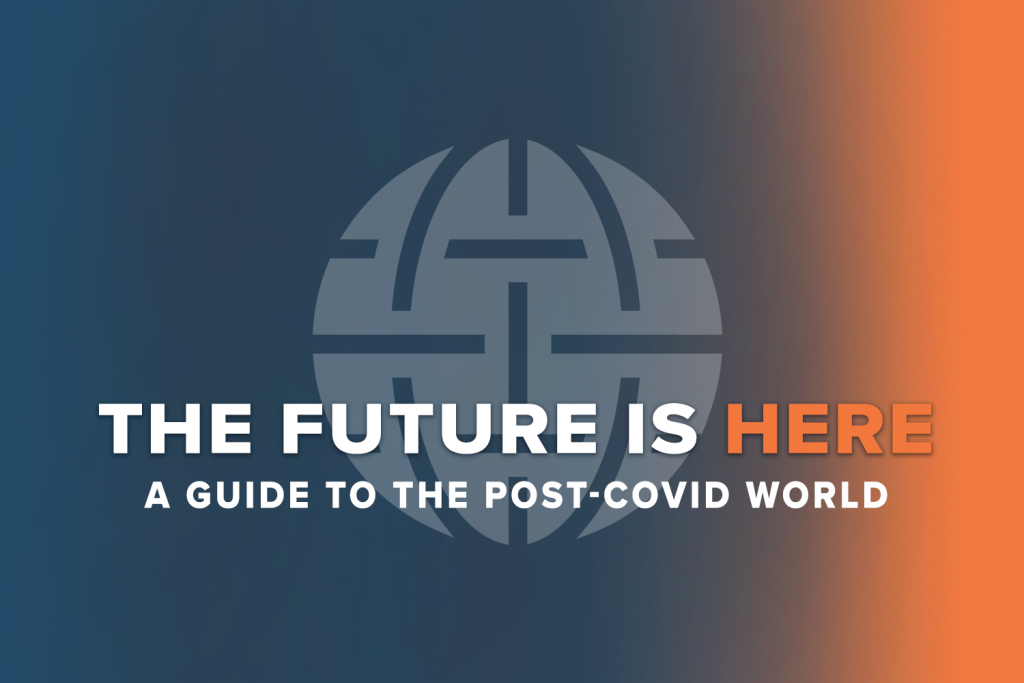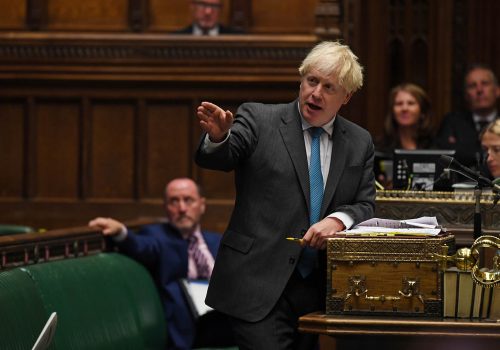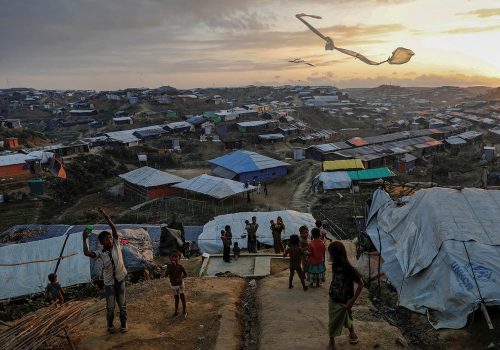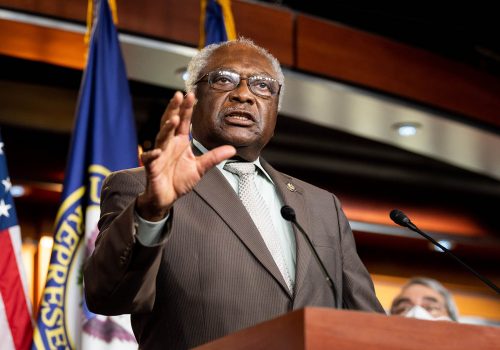The future is here: A guide to the post-COVID world 09/24/2020
Welcome to your guide to where the world is headed during the pandemic era and beyond. Each week, we’ll bring you the latest and most significant expert insights and international news about how coronavirus is reshaping international affairs. To stay updated each week, sign up to the newsletter here.
Let’s take a spin around the globe, in seven minutes or less.
In top stories this week:
- China and the US are duking it out over the pandemic at the UN General Assembly.
- Russia is engaging in vaccine diplomacy in South America, the Middle East, and Asia.
- The global jobs market has been hit harder than expected, but global trade is bouncing back faster than expected.
- But first…
The big story
This week’s key theme: We’re witnessing a massive, unplanned experiment on climate change.
Italians were floored by clean water in Venice’s canals. Indians marveled at the clean air through which they could glimpse Himalayan peaks. The pandemic abruptly arrested human activity worldwide, but some people pointed to a silver lining: The environment hadn’t been treated better in decades. Sure, the signs were anecdotal, but they seemed encouraging at a time when countries were all focused on fighting COVID rather than climate change.
Now that restrictions on human movement are easing, however, global greenhouse-gas emissions have returned to within 5 percent of what they were around the same time in 2019, after initially declining by 17 percent as the COVID-19 outbreak crested in the spring, according to a new report by the World Meteorological Organization. As one climate scientist has estimated, the pandemic’s overall impact on climate-warming emissions could amount to only a 0.01 degree-Celsius drop in temperature.
Nevertheless, the crisis still presents a big opportunity to counteract climate change, says Joe Mascaro in a recent interview with the Atlantic Council’s Foresight, Strategy, and Risks initiative, where he is a nonresident senior fellow.
Subscribe to The future is here: A guide to the post-COVID world
Sign up for a weekly roundup of top expert insights and international news about how coronavirus is reshaping international affairs.

A bonanza for scientific research
While the costs of the pandemic have been overwhelming, climate change will impose disruptions and calamities on a similar planetary scale. And there’s now an opening to leverage one crisis to prepare for the other. “We have a global situation that has created, essentially, an unplanned experiment,” and one that is “incredibly diverse in terms of variety of ecological systems affected,” explains Mascaro, director of education and research at Planet, a provider of satellite imagery and insights. “We have a chance to see how atmospheric gases, not just carbon dioxide, are altered by the massive global changes in human behavior,” he notes, and “I think you’ll see many years of research coming out of this unusual situation.”
Fewer people, for example, are flying: As of mid-September, the number of scheduled flights worldwide was still down by nearly 50 percent. Fewer people are driving too: During the pandemic, the number of vehicle miles traveled fell by as much as 50 percent in the United States and 66 percent in Europe.
The bottom line: At this transitional point in the pandemic, it’s difficult to predict how the results of this experiment will translate into policy outcomes. And with the next UN climate-change conference, COP26, postponed until 2021 due to the coronavirus, it may take years to understand the policy consequences of this moment. But while the planet won’t magically heal as a result of the sudden suspension of normal human affairs, policymakers can still draw on lessons from this peculiar period to design their responses to the climate crisis.
The big picture
This week’s theme, visualized: Renewable energy just had a moment
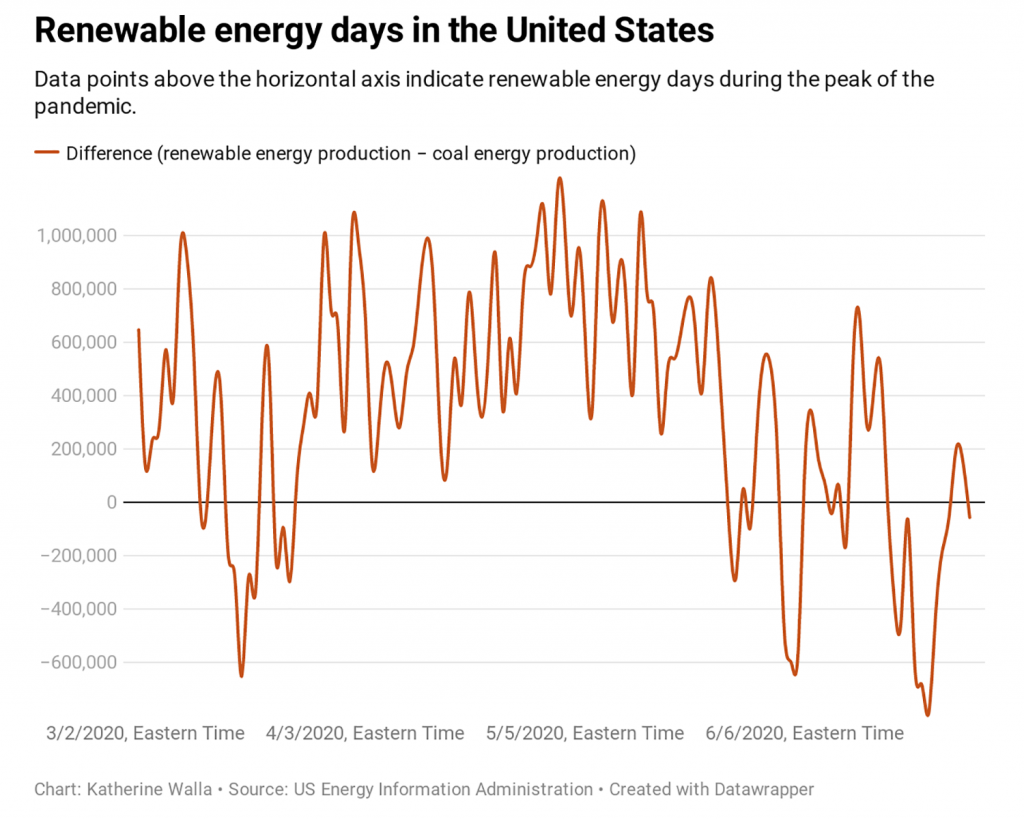
From March 1 to July 1, the United States, one of the world’s largest contributors to climate change, witnessed a dramatic increase in days that saw less coal production than renewable-energy production. The trend could lead to increased reliance on renewables that outlasts the pandemic.
The world in brief
Insights from across the planet, in ten bullets or fewer
- At the United Nations, superpowers are trading punches on the pandemic. US President Donald J. Trump told the UN General Assembly that China must be held to account for starting the pandemic, while the Chinese government countered by accusing him of “lies” and stirring up discord. The “competing visions,” as Reuters puts it, come as relations between the world’s two biggest economies reach their worst point in decades.
- (Limited) progress has been made in ensuring access to a vaccine. Some sixty-four countries have contributed $700 million to a fund called Covax designed to secure equitable global access to a COVID vaccine. Another thirty-four nations are expected to lend their support in the coming weeks too. Notably, the frontrunners in vaccine development—the United States, China, and Russia—haven’t pledged support, notes Quartz. Meanwhile, Russian officials are boasting that they are in various stages of talks to sell their vaccine—Sputnik V—to more than ten countries, among them Brazil, Mexico, Saudi Arabia, and India, the Wall Street Journal reports. The move could increase Russia’s leverage over those countries, the paper adds.
- QUOTE: “The race for vaccines is a collaboration, not a contest,” The Washington Post cited World Health Organization Director-General Tedros Adhanom Ghebreyesus as saying. “This is not charity. It’s in every country’s best interest. We sink or swim together.”
- Johnson & Johnson have started late-stage trials of a potential vaccine. It’s the fourth drugmaker backed by the Trump administration’s Operation Warp Speed vaccine program to enter late-stage trials, joining Moderna, Pfizer, and AstraZeneca. As many as 60,000 adult volunteers will take part in the Johnson & Johnson trial in more than two hundred locations in the United States and other countries, CNBC says. There may be enough data for results by the end of the year, with a plan to produce one billion doses of the single-shot vaccine next year, The Washington Post reports.
- In with tests for departing airline passengers, out with quarantine. That’s the call by the International Air Transport Association (IATA), with global airlines saying stay-at-home orders for returning travelers have made a travel slump even more dire. Speedy and inexpensive antigen tests—that non-medical staff can administer—are slated to become available in the coming weeks and should be rolled out worldwide, IATA Director General Alexandre de Juniac told reporters.
- Bad news: The pandemic is hitting the global jobs market harder than expected. People worked 17 percent fewer hours in the second quarter of 2020 than at the end of last year, equating to the loss of nearly 500 million jobs, the International Labor Organization (ILO) says. That’s 100 million more jobs lost than predicted in June, a development that is at least partly due to an increase in infections, Bloomberg reports. What’s more, lower activity now could translate to more inequality later, says the ILO.
- Better news: Global trade is bouncing back at a faster rate than expected, but the gains are uneven. Trade has recovered more quickly than it did in the wake of the 2008 financial crisis, defying predictions that the pandemic could result in a serious setback for globalization, The Wall Street Journal reports. While trade is still below pre-pandemic levels, about half of the historic loss this year was recouped by June, calculates the Kiel Institute for the World Economy, a German think tank. Whether a resurgence of infections in the fall will jeopardize this recovery is yet to be seen.
- Europe is tiptoeing around another lockdown to tackle a second wave. A summer lull in new infections has come to an end. But reluctant to re-impose a full lockdown, European authorities are using measures like curfews in bars and restaurants, as well as tighter rules on face masks, CNBC reports. UK Prime Minister Boris Johnson, in urging people to work at home and beefing up fines for those who flout restrictions, said the country was at a “perilous turning point.” Officials in the Spanish capital, Madrid, said they needed foreign doctors to help check the spread of COVID-19, but that they could not hire them quickly enough due to lockdown regulations, Reuters says.
- Lawsuits to settle pandemic damages are underway. A consumer group is suing the Austrian government over outbreaks in the western Tyrol, with one resort linked to infections in forty-five countries, the BBC reports. Authorities say they acted on what they knew at the time. Meanwhile, a century-old maritime law may spare cruise operator Carnival from costly claims, Bloomberg reports. Payouts may be limited to burial costs for passengers killed by the virus.
- The pandemic’s border shutdowns have split a community—without any COVID cases—in two. The COVID-19-free town of Hyder, Alaska, on the US-Canada border, called for easing travel restrictions to allow border crossings and establish some semblance of normal life, The Washington Post says. The sixty people in Hyder not only rely on the adjacent Canadian town of Stewart—home to four hundred people—for gas, school, groceries, and electricity, but they even set their clocks to Stewart time and use Stewart area codes for their phone numbers.
The inside scoop
Insights from the Atlantic Council
Collective wisdom
Observations from our community
We want to learn from you. What are you noticing in your area of expertise or corner of the world about where the post-COVID international system is headed?
Email editor@atlanticcouncil.org with your thoughts about how the coronavirus crisis is playing out in your world, and you may be featured in an upcoming edition.
